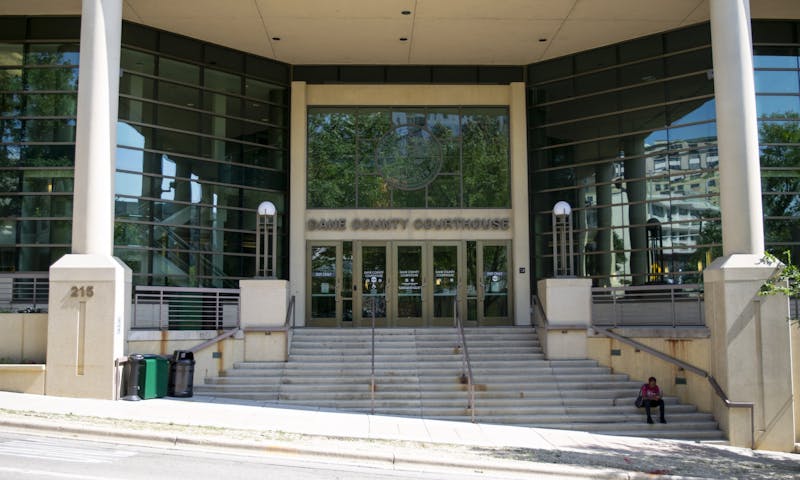

The criminalization of people with disabilities, people of color and people of color with disabilities are some of the most heinous examples of systemic discrimination. Mass incarceration of these marginalized, and often underprivileged, populations funnels thousands into a broken system characterized by intolerance and abuse.
This phenomenon has become an increasingly devastating issue for youth in particular. Moreover, youth with disabilities and of color are disproportionately affected by policing and disciplinary practices in schools. Zero-tolerance policies, police presence and overall neglect push them out of schools and into the juvenile system — effectively reinforcing the school-to-prison pipeline.
Even here in Madison, the disproportionate effects of school policing are exhibited at Madison Metropolitan School District high schools. According to the Madison Police Department, 390 citations were issued to 335 individuals over the course of three academic years, starting from 2015 to 2018.
The top five offenses included truancy, disorderly conduct, unlawful trespasses, battery and casual possession of cannabis. Of these offenses, students aged 14 to 17 made up the largest majority, while African-American students made up 68 to 77 percent of issued citations.
While this specific report did not include information on students with disabilities, it is common knowledge that these folx are largely affected by policing practices in schools.
According to the National Council on Disability, studies show that up to 85 percent of youth in juvenile centers are those with disabilities, with a disproportionate number being youth of color. From learning disabilities to mental health issues to physical disabilities, students who do not fit institutional views of who can be educated become disenfranchised from the system.
Present throughout the state, and not just in Madison, the intense policing and harsh disciplinary practices toward these marginalized students lead to a greater likelihood they will become looped into the criminal justice system.
The presence of police further exacerbates the school-to-prison pipeline. We have been forced to live in a world where children’s lives are guided by the existence of cops in schools, instead of counselors or social workers. The presence of school resource officers (SROs) creates a hostile environment in which being disciplined becomes equivalent to being arrested.
Often justified for ensuring safety or maximizing learning outcomes, police presence on school grounds ignores the brutal reality people of color in this country experience — one of complete and utter fear in the presence of law enforcement. And to extend this to children is frankly absurd. In a setting where students should become informed citizens, pursue their passions and form relationships, they are instead subject to constant unease and fear of being arrested for what seem to be trivial reasons.
Draconian school policies that essentially stifle the livelihoods of disabled students and students of color must come to an end. Students — children — should be educated, not incarcerated for minor infractions.
The state’s largest public school district, Milwaukee Public Schools, further exemplifies this perpetuated reality within our state.
In the 2013-’14 academic year alone, 91 percent of students with disabilities were restrained or put in seclusion, while only accounting for 20 percent of enrollment in the school district. In just this one district, students with disabilities are found to be suspended at a rate of one in five, while those without disabilities are suspended at half that rate — one in ten.
Similarly, black students within the Milwaukee School District are expelled 100 times more than their white counterparts. They are also overrepresented at nearly 85 percent of referrals to law enforcement, while only accounting for 55 percent of the student population.
Such statistics alone make it abundantly clear that students of color with disabilities are likely to face compounding discrimination. Though data isn’t widely available on this population in Wisconsin alone, national statistics show that one in five Black, Native American and multiracial boys with disabilities receive a suspension compared to only one in ten white boys with disabilities.
Rather than providing counseling services or extra educational assistance to students with disabilities, especially those of color, they are instead ostracized from the education they are entitled to. In order for a prosperous future, we must invest in our youth; yet, when subsets of this population are deemed unworthy, pushed out and criminalized without a second-thought, white hegemony is only further perpetuated.
It is vital for Wisconsin to mitigate the school-to-prison pipeline that is ever-present in our state.
Local cities, state government and non-governmental organizations must combat the stigma against disabilities and special education that schools reinforce through segregation and sub-par curricula. Specialized education is important, but it must be done in an inclusive manner for both the educational sufficiency and well-being of these marginalized students.
School policing must also come to an end — there should never be cops in schools. Rather, these personnel must be replaced with counselors, behavioral specialists and restorative justice coordinators. Misbehavior must be understood and corrected rather than penalized without explanation. This is especially a call to action to teachers themselves, for they know their students better than any SRO or administrator. By training and supporting teachers to better go about disciplinary situations, they can help curb the school-to-prison pipeline by helping to keep children of color with disabilities in school.
Education and safety are not merely for white able-bodied students. There are thousands of children of color and with disabilities who deserve to be in the classroom, who deserve a chance at a life of endless opportunity — not one restricted behind bars.